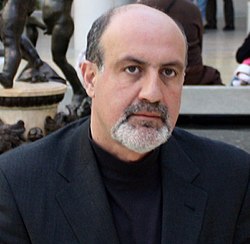Nassim Nicholas Taleb Quote
I am used to facing, at the end of a conference lecture, the question So what is the difference between robust and antifragile? or the more unenlightened and even more irritating Antifragile is resilient, no? The reaction to my answer is usually Ah, with the look Why didn’t you say that before? (of course I had said that before). Even the initial referee of the scientific article I wrote on defining and detecting antifragility entirely missed the point, conflating antifragility and robustness—and that was the scientist who pored over my definitions. It is worth re-explaining the following: the robust or resilient is neither harmed nor helped by volatility and disorder, while the antifragile benefits from them. But it takes some effort for the concept to sink in. A lot of things people call robust or resilient are just robust or resilient, the other half are antifragile.
I am used to facing, at the end of a conference lecture, the question So what is the difference between robust and antifragile? or the more unenlightened and even more irritating Antifragile is resilient, no? The reaction to my answer is usually Ah, with the look Why didn’t you say that before? (of course I had said that before). Even the initial referee of the scientific article I wrote on defining and detecting antifragility entirely missed the point, conflating antifragility and robustness—and that was the scientist who pored over my definitions. It is worth re-explaining the following: the robust or resilient is neither harmed nor helped by volatility and disorder, while the antifragile benefits from them. But it takes some effort for the concept to sink in. A lot of things people call robust or resilient are just robust or resilient, the other half are antifragile.
Related Quotes
About Nassim Nicholas Taleb
Taleb is the author of the Incerto, a five-volume work on the nature of uncertainty published between 2001 and 2018 (notably, The Black Swan and Antifragile). He has taught at several universities, serving as a Distinguished Professor of Risk Engineering at the New York University Tandon School of Engineering since September 2008. He has also been a practitioner of mathematical finance and is currently an adviser at Universa Investments. The Sunday Times described his 2007 book The Black Swan as one of the 12 most influential books since World War II.
Taleb criticized risk management methods used by the finance industry and warned about financial crises, subsequently profiting from the Black Monday (1987) and the 2008 financial crisis. He advocates what he calls a "black swan robust" society, meaning a society that can withstand difficult-to-predict events. He proposes what he has termed "antifragility" in systems; that is, an ability to benefit and grow from a certain class of random events, errors, and volatility, as well as "convex tinkering" as a method of scientific discovery, by which he means that decentralized experimentation outperforms directed research.
